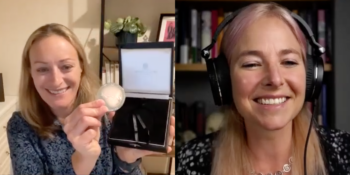
Nichola Raihani, Professor of Evolution and Behaviour at UCL, and author of The Social Instinct: How Cooperation Shaped the World, on Wednesday night delivered the Voltaire Lecture 2021 on the same title, in an event viewed by over 1,000 people worldwide and chaired by Humanists UK President Professor Alice Roberts.
Describing human cooperation as ‘our superpower’, Nichola noted that it is a defining characteristic of our species, arguing that the act of teaching and even the menopause itself – both almost unique to humans in the mammal class – are quintessentially cooperative, and evolutionary advantageous. She demonstrated how humans sometimes use instances of cooperation – such as generous giving, especially when visible to others – in the same way male peacocks develop ostentatious feathering, while cautioning that generosity and cooperation being evolutionary advantageous to the cooperator does not mean these acts are done cynically, or even consciously. And she paused to reflect on abuses and ‘victims’ of a cooperative spirit, seen in cartels, cronyism, and nepotism, and the effects of failure to cooperate, as seen in environmental and ecological destruction, arguing that cooperation must move past the locally cooperative behaviours we’ve evolved, and consider how we can cooperate more effectively at a larger, even global, scale.
Following the lecture and an expansive question and answer session, Alice Roberts presented Nichola with the Humanists UK Voltaire Medal, for demonstrating that we need not think of cooperation, altruism, or empathy as inhuman, or unnatural instincts, behaviours, or desires, and for her research and promotion of science with the potential to make very significant impact on how we see the human being.
Humanists UK Chief Executive Andrew Copson said:
‘Science increasingly validates the humanist intuition that to be cooperative – to think for yourself, and act for everyone – doesn’t require fighting against our human nature but the opposite. Professor Raihani’s Voltaire Lecture and her new book are an outstanding contribution to this growing field. If humanity can harness our evolved headstart and learn to cooperate more widely – while avoiding cooperation’s unwanted pitfalls – we can bring about the kinder, more rational, more tolerant world humanists seek.’
Notes:
About Professor Nichola Raihani
Nichola Raihani is a Royal Society University Research Fellow and Professor in Evolution and Behaviour at University College London (UCL). Her group’s research focuses on the evolution of social behaviour in humans and non-human species.
She has been widely published in scientific journals, won the 2018 Philip Leverhulme Prize in Psychology for her research achievements, and was elected Fellow of the Royal Society of Biology in 2018. She is also the author of The Social Instinct: How Cooperation Shaped the World (Penguin, UK, 2021) and has appeared on several podcasts and radio shows, including BBC Radio 4’s Hacking the Unconscious, and Thought Cages and RSA’s Bridges to the Future.
About Professor Alice Roberts
Alice Roberts has been President of Humanists UK since January 2019. She’s Professor of Public Engagement in Science at the University of Birmingham, Director of Anatomy for the NHS Severn Deanery School of Surgery, and holds honorary fellowships at Hull, York Medical School, and the University of Bristol.
She combines her academic career with one as a science presenter on television. She has appeared as a human bone specialist on Channel 4’s Time Team and in various projects on BBC2, including Coast, Don’t Die Young, The Incredible Human Journey, Wild Swimming, Digging for Britain, Horizon, and Origins of Us.
She is an honorary fellow of the British Science Association, a member of the Advisory Board of the Cheltenham Festival of Science, Patron of the Association of Science and Discovery Centres, and a member of the Council of the British Heart Foundation.
She has co-authored The Little Book of Humanism published in 2020, and The Little Book of Humanist Weddings, published today.
About the Voltaire Lecture series
The Voltaire Lecture explores ‘any aspect of scientific or philosophical thought or human activity as affected by or with particular reference to humanism’. The Voltaire medallist has made a significant contribution in one of these fields.
The lecture and medal are named for the philosopher Voltaire and the Voltaire Lectures Fund was originally established by the legacy of Theodore Besterman, biographer of Voltaire.
About Humanists UK
Humanists UK is the national charity working on behalf of non-religious people. Powered by 100,000 members and supporters, we advance free thinking and promote humanism to create a tolerant society where rational thinking and kindness prevail. We provide ceremonies, pastoral care, education, and support services benefitting over a million people every year and our campaigns advance humanist thinking on ethical issues, human rights, and equal treatment for all.
In 2021, Humanists UK is celebrating its 125th anniversary with a renewed focus on its history. The new website Humanist Heritage is a rich new web resource that uncovers the untold story of humanism in the UK – a story of people, groups, objects, places, movements, publications, and ideas.
